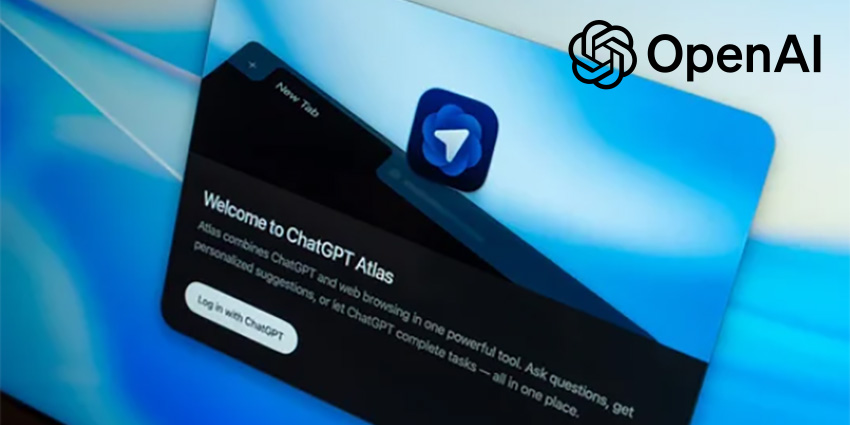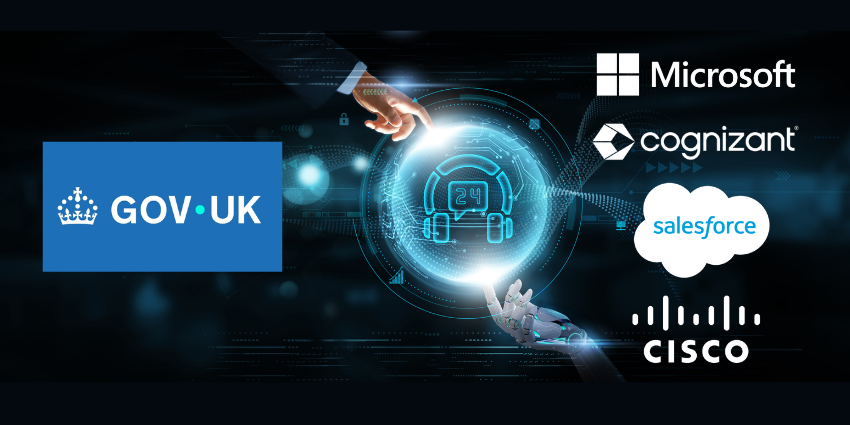OpenAI’s new Atlas web browser is making waves across industries, stirring debate about how AI could fundamentally change the way consumers search, shop, and engage with content online.
Atlas is designed to bring ChatGPT directly into everyday browsing. The macOS-only release integrates AI-powered search, summarization, and agent capabilities in one window, allowing users to ask questions, receive contextual answers, and complete actions without switching between tabs or relying on traditional search engines.
An optional memory feature allows ChatGPT to recall context from the sites the user visits, helping it deliver more accurate and personalized responses over time. OpenAI is expected to release versions for Windows, iOS, and Android soon.
In an interview with CX Today, Tom Hay, Senior Manager at PSE Consulting, described Atlas as “an evolutionary experience from existing browsers in that you’ve got a normal browser, and then you’ve got the ability to open up a ChatGPT window beside your normal browsing window.”
The AI is “context sensitive, so it knows what it is that you’re browsing, and so you can ask questions and get information about what you’re browsing.”
While the integration of ChatGPT marks a shift in how people interact with the web, Hay noted that despite its novelty, “at the moment, I don’t think that it is so different from using ChatGPT beside an existing browser.” As Atlas develops, it will become more tightly integrated and powerful, Hay said. But for now,
“It’s going to take something significantly better in order to move people away from Chrome, which they might be locked into.”
Indeed, Chrome still dominates the market, holding more than 65% of global web browser share, a position that’s made it a prime target in the ongoing AI data race.
Major chatbot developers, including OpenAI, have been eager to move into the browser space to secure richer, real-world data for training their large language models (LLMs). OpenAI has even hinted at interest in Chrome itself, should regulators ever force Google to divest.
The launch of Atlas follows a recent court decision that allowed Google to keep its browser business intact, leaving OpenAI to carve its own path into everyday web use. Rivals like Perplexity are also moving fast with their own AI-powered browsers.
Dilemma for Merchants as AI Enters the Shopping Journey
Still, over time, OpenAI’s partnership with Stripe, through its Agentic Commerce Protocol (ACP), could redefine how consumers discover and buy products.
Hay explained that ACP “works on the basis of a merchant providing a product catalog feed into OpenAI, which it can then use.” This allows ChatGPT to act as a digital shopping assistant.
“If I say I would like to buy a blue striped T-shirt, then OpenAI can go and look at all the product catalogs that it’s got access to and say, okay, here’s all the blue striped T-shirts that I know about.” Over time, “it will become better and better, providing you with a very tailored set of products.”
However, the same technology that simplifies purchasing could sideline retailers. Hay warned:
“The merchant’s website has been completely disintermediated… They’ve got no chance to upsell, cross-sell, get your marketing preferences, anything like that.”
That loss of direct engagement leaves many merchants “between a rock and a hard place because they know that if they refuse to play ball with the agentic commerce, then they will start losing more and more traffic.”
Many merchants had expected agentic commerce to be two or three years away, and now they are “scrambling” to respond, Hay said.
“Certainly some of them are saying this now goes close to the top of their priority list.”
When asked whether merchants might block AI agents, Hay replied, “only the biggest ones can afford to. And we’ve seen even Walmart in the US has come on board, and they’re one of the early adopters of ACP.”
He added, “Amazon is the only one that is blocking completely. Presumably they’re big enough and they have enough customer loyalty to say, ‘no, we know people are going to come to our website anyway.’”
Hay predicted merchants will eventually negotiate with OpenAI to regain some visibility: “OpenAI will allow merchants to… show through more of their promotions.
“OpenAI want to keep people within their ecosystem, so they don’t want them jumping completely out onto the merchant’s website. But I’m sure there will be negotiations so that merchants can expose more of their offers and marketing… It will help both parties because a bigger basket means bigger commission and fees for OpenAI.”
From the customer’s perspective, Hay believes that “as long as you are still in the decision loop… making an agentic payment… is not going to be that much different from clicking on the Buy Now button within Amazon, except it will work on any merchant site.”
He distinguished between guided and autonomous shopping:
“It’s one thing to say, ‘go and find me some blue T-shirts. I’m going to choose the one that I want.’ It’s a whole different level to say, ‘go off and find a blue t-shirt and buy it for me.’”
AI could even amplify loyalty behaviors. “If I’m a brand loyal shopper, then the AI will be able to proactively notify me when my preferred brands launch new product lines.” On the other hand, “if I’m much more of a price-conscious shopper, then it can act like Pricerunner… AI will be able to proactively notify me… of a good bargain which has just come up.”
Beauty and wellness marketplace Fresha says ChatGPT Atlas could revolutionize how people discover and book services online.
“AI is no longer just about answering questions, it’s about simplifying real decisions,” said Matthew Dyer, Product Manager at Fresha. Atlas can “search for nearby salons on Fresha, summarize verified client feedback, and display live availability in seconds.” Users can describe what they’re after and the browser “suggests the most relevant treatments and professionals nearby.”
“We’ve always believed booking beauty and wellness should feel effortless. Tools like Atlas bring that vision closer by combining the power of AI with the trust and transparency Fresha is built on,” Dyer explained.
Beyond commerce and bookings, the launch of ChatGPT Atlas is also rewriting the rules of content visibility, warns Storyblok, the enterprise content management system (CMS).
“Atlas isn’t just a browser; it represents a paradigm shift in how people will access information,” said Dominik Angerer, Storyblok’s CEO and co-founder. “Over the past two years, we’ve seen generative AI rewrite the rules when it comes to online visibility. It’s no longer about securing the coveted number one spot but rather about appearing in AI-generated answers.”
“This launch changes the rules of content strategy,” Angerer said. “To win in the era of AI-driven answers, brands must be cited, present and seen as credible authorities. Priority must be given to clarity, consistency and demonstrable authority.”
Angerer concluded:
“Brands that treat online visibility as an architecture problem, not just a marketing one, will thrive in this new landscape.”
For broader e-commerce, Hay emphasized that trust is critical. “If you are going to use ChatGPT to select products for you… you have to be confident that it’s acting on your behalf and choosing what you would want rather than steering you in the direction of some promoted products.”
But with Google earning “$250 billion last year from their advertising revenue, the incentives for ChatGPT and the other companies to start taking sponsorship and steering you in particular directions are massive.”
Security concerns also loom large, Hay warned:
“If you are handing over your card details to ChatGPT… how do you know that it’s only going to buy stuff that you asked it to…or what if someone hijacks the agent, or what if someone steals your card details from the agent?”
Agentic bots could amplify fraud: “If they feed that stolen card into an agentic bot and say, go off and try a thousand websites, suddenly fraud will happen at a massive scale and very, very quickly.”
AI browser assistants have been found to collect extensive personal data from users’ web activity, according to a recent study by University College London. Several assistants transmitted full webpage content — including form inputs such as online banking details or health data — to their servers.
Competing Standards: OpenAI vs. Google
Both OpenAI and Google have developed protocol standards to define how AI agents handle online shopping and payments safely.
Agentic Commerce Protocol (ACP), developed by OpenAI and Stripe, is an open standard designed to facilitate seamless transactions between AI agents, buyers, and businesses.
In contrast, Google’s Agent Payments Protocol (AP2) focuses on building a secure and transparent framework for AI-driven transactions. It introduces the concept of “Mandates,” which are cryptographically signed records of user intent, ensuring that AI agents have explicit authorization to make purchases on behalf of users.
The OpenAI–Stripe initiative (ACP) is “a pragmatic tactical move… let’s get something out there into the real world as quickly as possible and start capturing market share,” Hay noted, while Google’s AP2 is “a much more of a slow burn… trying to establish trust between the consumer, the merchant, the payment providers, and the card issuers.”
Hay said AP2’s cryptographic safeguards are designed to ensure “it was really the merchant that was displaying the basket to me… right through to your card issuer.” However, ACP’s early entry could help OpenAI gain traction faster: “In the meantime, ACP tactically is grabbing market share.”
Visa’s new Trusted Agent Protocol, “sits somewhere in this ecosystem,” Hay noted. “Visa can impose their will to a certain extent. And I expect that MasterCard will also follow up with something quite similar.”
Regulators are trailing far behind innovation. Hay noted that “it will take two or three years before they even start” addressing agentic e-commerce.
“ACP has launched in the US where [European] regulation doesn’t apply, but it’s going to take a little while before OpenAI and Stripe manage to bring it to Europe and are able to meet these European regulations.”
Hay added that “at the moment, PSD3 is in the pipeline in Europe,” but “there is nothing in the current drafting which even imagines AI agents.” That may require some specific legislation to fill the gap and regulate agentic commerce.
“The card schemes will impose their rules sooner than the national regulators get into place… simply because Visa, MasterCard, and Amex have to operate in the real world and solve real problems.”
The Future of Agentic Commerce
Despite the challenges, Hay expects agentic commerce to quickly become a staple of online retail. “It took e-commerce 10 or 15 years to reach a critical point where it was part of everyone’s normal daily life. That’s clearly going to happen a lot more quickly with agentic. I would reckon that within the next three years, it’s going to be a very significant part of e-commerce.”
As OpenAI continues expanding Atlas and its partnerships, merchants could soon see AI-driven discovery become the default experience, where personalization, convenience, and trust converge in a single browser window.







